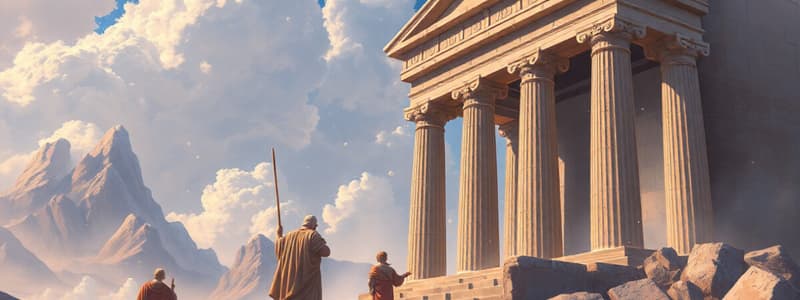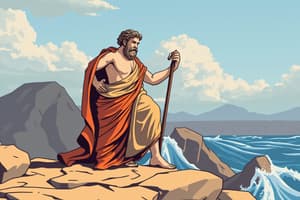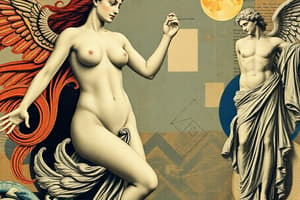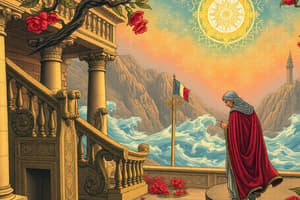Podcast
Questions and Answers
Considering the disputed authorship of the Iliad and the Odyssey, which statement best reflects the scholarly consensus regarding their creation?
Considering the disputed authorship of the Iliad and the Odyssey, which statement best reflects the scholarly consensus regarding their creation?
- While a historical figure named Homer may have contributed to the epics, the *Iliad* and the *Odyssey* likely represent an amalgamation of oral traditions refined and compiled over generations, with Homer potentially serving as a key editor or synthesizer. (correct)
- Both epics were demonstrably the product of a sophisticated scribal culture centered in Mycenae, predating any possible existence of a poet named Homer by several centuries, as evidenced by Linear B transcriptions.
- Homer, a singular, divinely inspired genius, meticulously crafted both epics in their complete and final forms during the 8th century BCE, leaving no room for later modification or interpolation.
- The *Iliad* was definitively authored by Homer, whereas the *Odyssey* emerged from a collective of anonymous poets, with its thematic unity imposed retroactively by Hellenistic scholars.
If the Iliad focuses on events that happen in the tenth and final year of the Trojan War, what critical understanding is essential to interpreting the epic's narrative scope?
If the Iliad focuses on events that happen in the tenth and final year of the Trojan War, what critical understanding is essential to interpreting the epic's narrative scope?
- The immediate socio-political context within Troy during that final year, giving an even-handed account of the perspectives of both the conquering and the conquered peoples.
- A microcosm of the entire war, selectively highlighting pivotal episodes and character interactions that encapsulate the broader themes, motivations, and consequences of the conflict. (correct)
- The entirety of the decade-long Trojan War, detailing all major battles and strategic decisions chronologically from its initial provocation to its ultimate resolution.
- A complete genealogical account of all the Achaean and Trojan heroes involved, meticulously tracing their lineage and divine ancestry to establish the legitimacy of claims to power and honor.
Given the significance of oral tradition in the transmission of the Iliad and Odyssey, what methodological challenge confronts scholars attempting to reconstruct the 'original' form of these epics?
Given the significance of oral tradition in the transmission of the Iliad and Odyssey, what methodological challenge confronts scholars attempting to reconstruct the 'original' form of these epics?
- The deliberate obfuscation of the epics' 'true' meaning by mystery cults, necessitating the application of esoteric hermeneutical techniques to penetrate the veil of allegorical symbolism.
- The destruction of the original Mycenaean tablets containing the 'definitive' versions of the epics, precluding any possibility of verifying the accuracy of later oral and written traditions.
- The lack of any surviving contemporary accounts of the Trojan War from non-Greek sources, making it impossible to corroborate or contextualize the events depicted in the *Iliad* and *Odyssey*.
- The inherent instability of oral transmission, rendering any reconstruction speculative due to the inevitable variations, interpolations, and adaptations introduced by successive reciters across generations. (correct)
In what way does the concept of 'nostos' (νόστος) in the Odyssey serve as a thematic counterpoint to the Iliad's focus on 'kleos' (κλέος)?
In what way does the concept of 'nostos' (νόστος) in the Odyssey serve as a thematic counterpoint to the Iliad's focus on 'kleos' (κλέος)?
Considering the role of divine intervention in both the Iliad and the Odyssey, how might a critical theorist interpret the gods' actions not merely as plot devices, but as reflections of deeper socio-political dynamics?
Considering the role of divine intervention in both the Iliad and the Odyssey, how might a critical theorist interpret the gods' actions not merely as plot devices, but as reflections of deeper socio-political dynamics?
Flashcards
What is an epic?
What is an epic?
A long poem narrating the deeds of great heroes in a grand style.
What is the Iliad about?
What is the Iliad about?
A tale of war focusing on the tenth year of the siege of Troy by Greek kings.
What is the Odyssey about?
What is the Odyssey about?
The journey home of the Greek hero Odysseus after the Trojan War, filled with challenges.
What does BCE stand for?
What does BCE stand for?
Signup and view all the flashcards
What are myths?
What are myths?
Signup and view all the flashcards
Study Notes
- An epic is a long poem that narrates the deeds of great heroes.
- The Iliad and the Odyssey are two ancient Greek epics that have survived for over 2,500 years.
- The Iliad centers on the Trojan War, specifically events in its tenth and final year.
- The Iliad gets its name from the Greek term for Troy: Ilium.
- The Odyssey tells the story of the Greek hero Odysseus' journey home after the Trojan War.
- Odysseus faces many adventures and hardships as he travels back to his homeland.
- "Odyssey" is a term used for any lengthy voyage filled with challenges.
- Homer, a blind poet from the 8th century BCE, may have composed these epics.
- Homer traveled and recited poems for a living.
- It is believed that the Iliad and the Odyssey are composite works from many poets, passed down orally.
- The poems were told and retold before being written down.
The Gods and Goddesses of Greek Mythology
- Understanding the Iliad and the Odyssey requires knowledge of ancient Greek religious beliefs.
- Greeks believed in multiple gods and goddesses governing various aspects.
- War
- Nature
- Music
- Poetry
- Other Arts
- Gods ruled different parts of the universe like the:
- Heavens
- Earth
- Sun
- Moon
- Oceans
- Rivers
- Mountains
- Forests
- Winds
- Storms
- Gods controlled events on Earth.
- The Iliad suggests that the gods guided events in the Trojan War.
- Gods took sides in the war, assisting Greeks or Trojans.
- Gods behaved like humans with emotions and arguments.
- They married, had children, and needed nourishment and sleep.
- Nectar was their wine and ambrosia was their food.
- Gods were immortal and eternally youthful.
- Gods could be wounded and feel pain.
- They participated in human conflicts and had weapons and armor.
- Gods possessed great powers like invisibility and shapeshifting.
- Earthly disasters were blamed on divine anger.
- Mount Olympus was the home of the gods, with golden palaces and grand banquets.
- Ancient Greeks built temples for worship, such as the Parthenon in Athens.
- People offered gifts at shrines and sacrificed animals on altars to please the gods.
- Zeus was the king of the gods, known as the "Mighty Thunderer", and hurled lightning bolts.
- Hera was Zeus' wife and queen of the gods and the great enemy of Troy and the Trojans.
- Aphrodite, a daughter of Zeus, was the goddess of beauty and love.
- Poseidon was the god of the sea, symbolized by a trident.
- Ares was the god of war.
- Hades was the god of the regions of the dead, the underworld.
- Apollo was a powerful god of the sun, medicine, music, and poetry.
- Pallas Athena was the goddess of wisdom.
- Hermes was the swift-footed messenger god, and god of wealth, luck and thieves.
- Hephaestus was the god of fire and the forge and made thunderbolts and weapons.
Soothsayers and Sacrifices
- Gods revealed their will through bird behavior, dreams, and direct appearances.
- Greeks consulted soothsayers to understand the gods' will.
- Priests in temples, known as oracles, gave answers to questions from the gods.
- The Temple of Apollo at Delphi was a well-known oracle in Greece.
- Greeks sacrificed to the gods before wars or important events.
- Sacrifices involved killing animals like sheep, goats, pigs, or cattle; burned as offerings.
- Defeats in battle were seen as the anger from Zeus or Olympus.
- Gods were called as witnesses when making treaties of peace.
Main Characters in the Iliad
Main Creek Characters
- Achilles is the Iliad's central hero, the greatest Greek warrior, known for his wrath.
- Agamemnon is the King of Mycenae, Menelaus’ brother, and commander of Greek forces.
- Ajax Telamon, a son of King Telamon, is an immensely strong and powerful warrior, distinguished from another warrior in the Iliad named Ajax by the name Ajax Telamon.
- Diomedes is the young king of Argos, noted for fighting bravely and speaking his mind.
- Helen, the wife of King Menelaus of Sparta, is taken to Troy by Paris, sparking the Trojan War.
- Menelaus is the King of Sparta, Agamemnon's younger brother, and Helen's husband.
- Nestor is the King of Pylos, too old to battle but is known for his wise advice.
- Odysseus is the King of Ithaca, and the central hero of Homer's Odyssey, and is known for his Cleverness.
- Patroclus is Achilles' devoted friend, brave warrior, and commander of the Myrmidons.
Main Trojan Characters
- Andromache is the devoted wife of Hector.
- Cassandra is Priam and Hecuba’s daughter, cursed that no one believes her gift of prophecy.
- Chryseis is the daughter of Chryses, a priest of Apollo, and taken captive.
- Hector is King Priam's eldest son, Troy's prince, and its bravest warrior.
- Hecuba is Troy's queen, Priam's wife, and Hector's mother.
- Paris is Troy's prince and Hector's brother, known for his beauty rather than bravery.
- Priam is the King of Troy, Hecuba's husband, and father of Hector and Paris.
Main Characters in the Odyssey
- Alcinous is the King of the seafaring Phaeacians who helps Odysseus return to Ithaca.
- Antinous is a leader among the suitors vying to marry Penelope.
- Argos is Odysseus' old dog.
- Eumaeus is Odysseus' loyal swineherd who helps fight the suitors.
- Eurycleia is Odysseus' trusted servant and nursemaid to Odysseus and Telemachus.
- Eurymachus is a leader among the suitors seeking Penelope's hand.
- Laertes is Odysseus' father.
- Melanthius is a rude and disloyal goatherd serving Odysseus' household.
- Menelaus is the King of Sparta, reunited with Helen, and welcomes Telemachus.
- Nausicaa is the daughter of King Alcinous, who assists Odysseus in Phaeacia.
- Nestor is the King of Pylos who welcomes Telemachus seeking news of Odysseus.
- Odysseus is both King of Ithaca and hero of the Odyssey, who returns to his wife and homeland.
- Peisistratus is Nestor's son, becomes close to Telemachus, and aids in finding Odysseus.
- Penelope is Odysseus' faithful wife, using her wits to fend off suitors seeking marriage.
- Philoetius is the loyal cowherd who assists Odysseus in overcoming the suitors.
Deities and Supernatural entities
- Telemachus is Odysseus and Penelope's son, who faces growth and challenges during the Odyssey.
- Aeolus is the god of the winds, helps Odysseus initially but later refuses.
- Aphrodite is the goddess of love and beauty.
- Apollo is the god of the sun, medicine, music, poetry, and archery.
- Ares is the god of war.
- Athena is Zeus' daughter, the goddess of wisdom and helper of Odysseus and Telemachus.
- Calypso is the goddess who holds Odysseus captive for seven years.
- Circe is the goddess and enchantress turning Odysseus' men into swine.
- Hades is the ruler of the underworld and god of the dead.
- Hephaestus is the god of fire and the forge, crafter of thunderbolts and weapons.
- Hera is Zeus's wife and queen of the gods.
- Hermes is the messenger of the gods, also associated with wealth, luck, and thieves.
- Iris is a messenger of the gods.
- Polyphemus is a one-eyed giant (Cyclops) who traps Odysseus in a cave.
- Poseidon is the god of the sea and earthquakes, antagonist to Odysseus, preventing his return.
- Thetis is a goddess of the sea, mother of Achilles.
- Zeus is the king of the gods, husband of Hera, and father of Athena, Aphrodite, Ares, and Apollo.
Before the Iliad
How the Trojan War Began: The Apple of Discord
- Troy stood on Turkey's northwest coast, near Mount Ida and the Aegean Sea.
- Protective walls surrounded Troy.
- King Priam and Queen Hecuba ruled Troy with prosperity.
- Cassandra, their daughter, was loved by Apollo.
- Apollo grants prophecy, allowing sight into the future to Cassandra but revokes ability for others to believe her.
- Cassandra predicted evil events, but nobody believed her.
- Hector was Priam and Hecuba's noblest son; Paris brought sorrow to Troy.
- Queen Hecuba dreamed of her infant son Paris, turning into flaming torch burning Troy.
- A soothsayer interpreted the dream: "if this babe lives, he shall be a torch to turn the walls and high towers of Troy into heaps of ashes."
- Priam ordered his master shepherd to leave the infant alone on Mount Ida to die.
- Spirits cared of the babe, saved the infant and protected it from wild animals.
- The shepherd returned after five days to find the baby Paris alive and took him home.
- Paris met Oenone, a river nymph of Mount Ida, and married her.
- A quarrel among Hera, Aphrodite, and Athena prompted sorrow.
The Quarrel of the Goddesses
- During Peleus and Thetis' wedding, Eris, the goddess of discord, was excluded.
- Eris threw a golden apple inscribed "For the fairest" into the wedding, causing arguments.
- Athena claimed the apple for wisdom; Aphrodite and Hera disagreed.
- No god dared to decide who was the fairest, Zeus assigned Paris, a shepherd on Mount Ida.
The Judgement of Paris
- The three goddesses appeared before Paris.
- Hera promised wealth and power.
- Athena promised wisdom and glory.
- Aphrodite promised the most beautiful woman on Earth.
- Paris awarded the apple to Aphrodite.
- Paris went to Troy.
- King Priam was holding athletic games.
- Paris won all games due to Aphrodite's gift.
- Paris announced he tended flocks on Mount Ida and reunited with Priam and Hecuba.
- Cassandra recognized Paris and warned the people of the evil he would cause.
- Paris was welcomed and given a prince's honor, forsaking Oenone.
Helen of Troy
- Paris had the promise to have the most beautiful woman in the world for his wife.
- Paris set sail to Sparta under Aphrodite's guidance.
- Helen was wife of Menelaus, King of Sparta.
- The king gave Paris banquets.
- Paris persuaded Helen to leave, assuring her of honor and safety from Menelaus' anger and took gold treasures.
- Paris and Helen reached Troy and married.
- Hector was angry and advised Priam to return Helen to Sparta.
- Priam refused, sparking war between Trojans and Greeks.
Studying That Suits You
Use AI to generate personalized quizzes and flashcards to suit your learning preferences.




